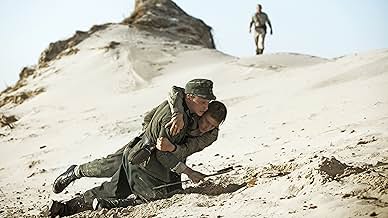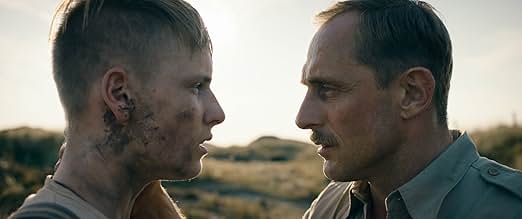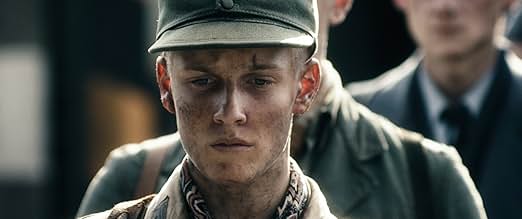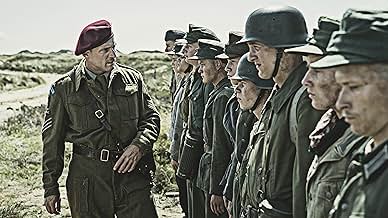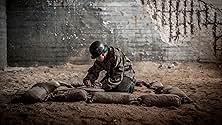Dans le Danemark qui a suivi la Seconde Guerre mondiale, un groupe de jeunes prisonniers de guerre allemands est contraint de nettoyer une plage contenant des milliers de mines terrestres so... Tout lireDans le Danemark qui a suivi la Seconde Guerre mondiale, un groupe de jeunes prisonniers de guerre allemands est contraint de nettoyer une plage contenant des milliers de mines terrestres sous la surveillance d'un sergent danois qui apprend lentement à appréhender leur situation.Dans le Danemark qui a suivi la Seconde Guerre mondiale, un groupe de jeunes prisonniers de guerre allemands est contraint de nettoyer une plage contenant des milliers de mines terrestres sous la surveillance d'un sergent danois qui apprend lentement à appréhender leur situation.
- Réalisation
- Scénario
- Casting principal
- Nommé pour 1 Oscar
- 33 victoires et 27 nominations au total
- Elisabeth, Karins Daughter
- (as Zoé Zandvliet)
- August Kluger
- (as Maximilian Beck)
Avis à la une
It is 1945 and the war is over, but the beautiful Danish coastline has two million deadly mines left buried in the sand by the Nazi occupation. Danish Sergeant Carl Rasmussen (Roland Møller) is assigned a squad of fourteen German prisoners of war who must clear a beach that contains 45,000 active mines. The Sergeant's treatment of the teenage boys is initially brutal: they live and work in terrible conditions, are practically starved and constantly reminded that everyone in Denmark hates them and nobody cares if they live or die. Their task is to crawl along the beach by hand, poking a stick in the sand to locate mines, then defuse them before they explode. Inevitably, many failed. With echoes of Stockholm syndrome, both captor and captives find glimpses of humanity in each other that leads to Rasmussen being suspected by his tormenting superiors of going soft on the Germans. He must walk the fine line between military obedience, personal hatred of Nazis, and his growing compassion and realisation that these are just boys who were conscripted into battle. His characterisation and its transition from hatred to acceptance frames the narrative of this high-tension drama.
Stunningly realistic cinematography with minute attention to detail amplifies the horror of this story. The acting is remarkable from a mostly unknown cast and Rasmussen's performance captures the very essence of moral conflict. The mine-clearing proceeds inch-by-agonising-inch, and the film's plot line inches forward at a similar pace. With camera at sand-level, we see close-up images of teenage warriors with beads of terror trickling down their faces as their sand-covered fingers slowly un-screw a detonator from a mine, knowing that an explosion will tear their body to pieces. These are some of the most heart-pulse racing moments you can experience through film. This is not entertainment nor is it for faint-hearted viewers; several scenes are horrific.
Most war films glorify battle or corner us into cheering one side or the other. This film presents an exquisite conundrum: was it morally acceptable for the Danish military to force German POWs to remove the deadly mines that the Nazi army left behind, knowing that most will die or be maimed? Or should this deadly work have been carried out by Danish soldiers? Was the inhumane treatment of teenage soldiers justifiable, regardless of the brutality of the Nazi occupation of Denmark? In the light of such questions, is this film one of justification or a confessional that seeks atonement? Land of Mine shines a bright light on what has hitherto been a dark secret of Danish history. It is a powerful and important story.
Set in post-World War II Denmark, the story of Land of Mine follows a Danish Sergeant who is assigned the duty to defuse & remove over 2 million mines that were buried by the Germans along the coast during the war. Receiving a batch of teenage Germans POWs to carry out the operation, the Sergeant's initial hostility towards them begins to undergo an unexpected change.
Written & directed by Martin Zandvliet, the film opens with a crucial sequence that establishes the seething hatred that the Sergeant has against Germans and takes it up from there. Every segment featuring the young boys trying to defuse the mines with their bare hands despite being obviously ill-equipped to carry out the dangerous task is nail-biting as hell and even more hard-hitting when they fail at it.
Zandvliet's direction exhibits terrific restraint from start to finish and even more admirable is how he handles the characters & their arcs. Without choosing a side, he puts believable people on screen and keeps all their human attributes in tact, whether they are Danish or Germans. And while the hostile nature of the former against the latter is understandable, what the Danish authorities force them to do is equally inexcusable.
Shot at historically authentic locations, the entire picture is splendidly photographed and the era of Denmark recovering from the war is wonderfully captured by its desaturated & earthy colour tones. Camera-work is hand-held, static & expertly controlled for the most part and allows the scenes to play out at their desired pace but the longer it lingers on the defusing process, the more suspenseful it becomes and majority of the time, ends on a heartbreaking note.
Editing is skilfully carried out, for every single minute of its 1½ hour narrative is accounted for & is relevant to the plot. Every sequence on the beach is compelling & handled with patience and every explosion or casualty reverberates with the audience & the impact of it is deeply felt. The film does feel longer than its runtime but it is relentlessly gripping till the end. And further enhancing its grim aura is the poignant score that always surfaces on time.
Coming to the performances, Land of Mine features an incredibly committed cast in Roland Møller, Louis Hofmann & others, with Hofmann impressing the most. Møller is in as the Sergeant overseeing the mine clearing operation and expresses his character's inner conflict brilliantly while Hofmann plays one of the young boys performing the fatal, endless task of defusing millions of buried mines with stunning balance, and the scenes between the two are its main highlight.
On an overall scale, Land of Mine not only ranks amongst the best films of its year but is one of the finest films to come out from Cinema of Denmark. Incessantly human, powerfully moving & making a strong statement about what makes us human & why it's even more important to stay as one in times of bitter conflict, this Danish masterpiece is an extremely riveting example of its genre that treads a difficult path & is utterly discomforting at times yet manages to fully redeem itself in the end. An essential viewing by all means, this Danish masterpiece comes very highly recommended.
Rarely do movie stick with me for days. 'Land of mine' did.
It's not an action-movie, like 'Dunkirk' or other movies set in and around World War 2. It's an important character study about humanity, desperation, resentment, anger, prejudice and hate that I think everyone need to see, even if they have no interest in World War 2. There are no good or bad guys here. Just people that try to deal with difficult situations commanded by other people above them.
They should make more movies like this.
Anyway, the film was heartbreakingly amazing. The WWII stories I had seen those told from the perspectives of the Australian, Japanese, Korean, Russian to African and European to the American western sea, Hawaii. And this is a Danish story, sets in just after the end of the war where prisoners of the war were used to clean up the mess. In the opening the teen German POWs were trained to defuse the land mine explosives and then later the unit was handed over to the Danish sergeant Carl Rasmussen where they are all going to work in one of the west coast landmines that was used to defend the Scandinavia by the Nazi. That is the story told how it all ends in the remaining parts.
This was like another 'Kajaki', but not actually a war film. Using of the prisoners as the labourers is a violation, according to the Geneva rule. That's the point of the film, focused to reveal the inhume act. But it was not anything like 'The Railway Man' 'Unbroken' or the 'The Bridge on the River Kwai'. Watching a film about the brave soldiers inspires us and bring patriotism, but in this those teen kid screaming whenever something goes wrong really brings heartache. So not everybody feels comfortable with it, especially the family audience. But there were lots of edgy moments and you would never know what events follows.
"If they are old enough to go to war, they are old enough to clean up."
It was shot is the real location, and I think that part contributed to depicting the actual atmosphere where most of the POWs lost their arms and legs and some exploded into many pieces in the air. It was a simple narration, but the visuals talked itself more than anything else. All the actors were outstanding, especially those 4-5 German teens and of course the Danish sergeant Carl. I think the Carl's influence had more impact, after seeing the opening scene where he went outrage and beat up those German soldiers returning home.
There are a couple of small twists, but there are some scenes which are not easy to get over. Even though we know those were just fake, but that does not work once you totally into the story deeply. This is a different kind of emotional film, something you rarely experience. The director who is also the writer must be appreciated for handling it perfectly. Especially keeping the screenplay uncomplicated and between the two nations, where in the real event involves the British officials. I have never seen his other films, but this one will define him forth and the people are going to recognise him. So I hope he'll keep up doing such level films in the future.
I have never seen such film, I mean seen some where the kids were tortured, but this was very unique and totally a different perspective for that takes place in the backdrop of the WWII. Especially the Germans perspective is the very rare kind. So I'm kind of thinking if Germany picks 'Look Who's Back' for the Oscars, the contest between these two would bring two different moods. At this point I don't remember any Danish film I have seen so far in my life other than this one which I feel is the best Danish film ever. I mean, come on, who would do such film where your own nation, if not the whole nation, the one who represent was shown in the negative shade over the Nazi Germans. This is definitely one of the best films of the year. Highly recommended.
8/10
Le saviez-vous
- AnecdotesThe actors were trained in mine clearance 'anno 1945' at the Military Training Compound 'Oksbøl.' During training, they found a 'live' mine that had been there for 70+ years--and it was in fine working condition. The mine was removed and disarmed by the Danish de-mining experts.
- GaffesThey are mainly clearing Anti-Tank mines, and indeed mention this in the dialogue. However, Anti-Tank mines are designed to not be triggered by a person's weight, so troops can cross them without them going off--so that they are still in place and active when armored vehicles in support of the troops ultimately cross the same path as the troops. Anti-Tank mines need several tons of pressure to activate. In the film, they are treated like eggshells.
- Citations
Lt. Ebbe Jensen: If they are old enough to go to war, they are old enough to clean up.
- ConnexionsFeatured in La noche de...: La noche de... Bajo la arena (2021)
Meilleurs choix
- How long is Land of Mine?Alimenté par Alexa
Détails
- Date de sortie
- Pays d’origine
- Sites officiels
- Langues
- Aussi connu sous le nom de
- Land of Mine
- Lieux de tournage
- Sociétés de production
- Voir plus de crédits d'entreprise sur IMDbPro
Box-office
- Budget
- 35 500 000 DKK (estimé)
- Montant brut aux États-Unis et au Canada
- 435 266 $US
- Montant brut mondial
- 3 169 553 $US
Contribuer à cette page








